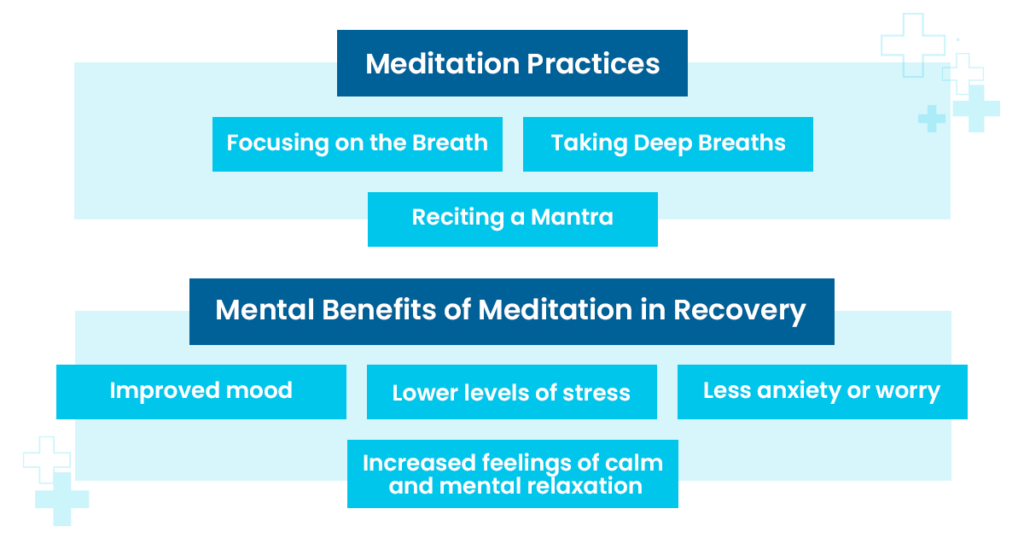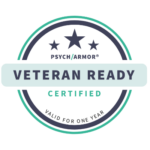
Meditation and mindfulness are proven to support addiction recovery by helping you feel calm, manage stressors, and avoid relapse. While it can not substitute a comprehensive addiction treatment program with expert medical care, meditation may be a beneficial holistic tool. In fact, many rehabilitation centers, like The Haven, use meditation and mindfulness as therapy techniques. Whether you are currently battling addiction, in treatment, or many years sober, practicing meditation can significantly benefit your recovery.
What Is Meditation?
Meditation is a simple and effective method with several health benefits, including reducing stress and anxiety. Meditation has grown more popular in substance abuse and general wellness circles because of its significant effects. The purpose of meditation is to connect the mind and body in order to promote mental health and quality of life. Taking deep breaths, reciting a mantra, and focusing on the breath results in increased awareness and connection.
Types Of Meditation
Meditation is characterized by a cross-legged sitting position known as the lotus stance, accompanied by slow, deep breathing. Meditation, like yoga, can change brainwaves and lessen feelings of depression, anxiety, and emotional triggers.
There are also several types of meditations that come with unique benefits including:
- Mindfulness meditation: focuses on enhancing attention, concentration, and awareness.
- Zen meditation: induces calm and promotes nonreactivity. It encourages practitioners to concentrate on the now and let go of the past by reinforcing their concentration on the present.
- Guided meditation: allows a person to envision peaceful mental images with the assistance of a facilitator.
- Transcendental meditation: uses a silent mantra and teaches effortlessness as a technique for achieving peace and reducing stress.
- Breathing meditation: a simple practice that requires you to concentrate on your breath and the sensations within your body. It can decrease the heart rate and reduce or maintain blood pressure levels.
- Mantra meditation: uses repetitive sounds to calm the mind. Repetition of a sentence relaxes the mind and helps you to tune in to your surroundings and concentrate on deepening awareness.
Why Is Meditation Good For Recovery?
When you go sober for the first time, your brain feels like it’s on overdrive. Suddenly, you become acutely aware of the world around you and the responsibilities associated with being a better person. You may have obsessive thoughts, irrational attitudes, and difficulty sleeping as your brain rushes.
Although meditation cannot cure racing thoughts, the breathing and mental health techniques associated with meditation have been clinically proven to calm people down. The breathing involved in meditation can convince your brain that everything is okay and give you a feeling of peacefulness you may not have experienced in years.
Benefits Of Meditation In Recovery
Recent studies have shown that mindfulness-based therapies, such as meditation, can reduce alcohol, cocaine, and amphetamine use. Mindfulness practice may also minimize the chance of relapse because it teaches the practitioner how to cope with unpleasant feelings, such as drug cravings or the harmful effects of drugs.
Mental Health Benefits
Meditation has a good effect on the mental health of people. People who practice meditation report:
- Improved mood
- Increased feelings of calm and mental relaxation
- Lower levels of stress
- Less anxiety or worry
Physical & Other Health Benefits
According to recent research conducted by medical professionals, meditation can also help in the treatment of a range of physical and mental health disorders, including:
- Insomnia
- Smoking Addiction
- High Blood Pressure
- Irritable Bowel Syndrome
- Ulcerative Colitis
- Pain
- Anxiety
- Depression
Meditation has several more benefits. Although mindful meditation cannot cure cancer, research indicates that it helps lung and breast cancer patients cope with pain, stress, poor self-esteem, and fatigue.
One study found that individuals suffering from chronic pain who meditated were able to reduce their pain by as much as 42 percent, leading to improved sleep, mood, and activity levels.
Meditation And Withdrawal
In withdrawal-related symptoms such as depression, anxiety, or insomnia, meditation might help the individual feel more grounded and relax the nervous system. A calm nervous system improves the overall quality of sleep and facilitates improved moods when awake.
Those with emotionally unbalanced thoughts due to diseases such as Obsessive-Compulsive Disorder can also learn to observe their thoughts without attachment. Additionally, meditation therapy enables one to reclaim control over impulses actively. For example, transcendental meditation has been used to reduce substance usage and the likelihood of relapse.
Tips For Meditating
You Can’t Force It
You cannot force yourself to meditate. It is not a challenge that can be conquered with brute force and then dropped after the reward has been obtained. Meditation is about letting go of this “action-reward” mentality and being mindful of the journey. Developing a healthy meditation habit requires time, practice, and self-compassion.
It Will Not Be A Waste Of Time
Even if you do not feel more self-aware or in control of your addiction after watching a thirty-minute meditation video, the time spent listening to the guide was not wasted. Taking thirty minutes out of your day to breathe deeply, check in with yourself, and relax is extremely beneficial to your physical health, even if you do not immediately experience emotional change.
The Hardest Part Is Starting
Knowing that these mental benefits need time and patience might make practicing mindfulness feel like a burden, but stressing about this will only make the process less effective. The most challenging part of meditation is deciding to devote time to yourself for the sake of the process rather than the reward.
Frequently Asked Questions (FAQs)
How do you meditate for recovery?
As you breathe, focus your attention on each inhale and exhale. Inhale gently and deeply. Maintain concentration on your breathing while you relax your muscles. If your mind begins to wander from the present, focus on breathing to bring it back.
Why is meditation important in recovery?
Meditation has been found in some studies to decrease blood pressure, improve heart health, and maybe even boost the immune system. After years of substance abuse-related damage to the body, meditation in recovery may help the physical healing.
What is mindfulness in recovery?
Mindfulness is the practice of paying conscious attention to the present moment. During this process, a person notes their feelings and thoughts without judging or criticizing them. It is a simple inventory of a person’s feelings from a purely unbiased perspective.
How does spirituality affect recovery?
Many people in recovery find it difficult to accept personal responsibility. Practicing spirituality can give healing from past mistakes. Often, spiritual healing entails forgiving people, reconnecting with them, and discovering a feeling of belonging.
The Haven Can Help You With Addiction Recovery
Effective and lasting recovery begins with treating the whole person, not just the substance use disorder (SUD). This involves addressing the mental health disorders at the root of addiction and equipping patients with the tools they need to live a happier, more fulfilling life.
The Haven provides a complete addiction treatment program with holistic therapy options such as meditation, recreational treatments, aftercare services, and relapse prevention programs. Meditation is a valuable component of these services for our patients.
Contact us at (561) 328-8627 today to learn more about admissions, treatment options, and how our programs may assist you in living a life free of substances.






